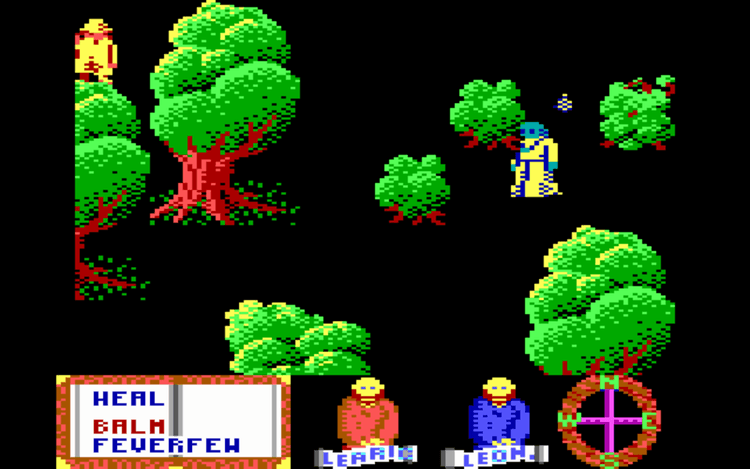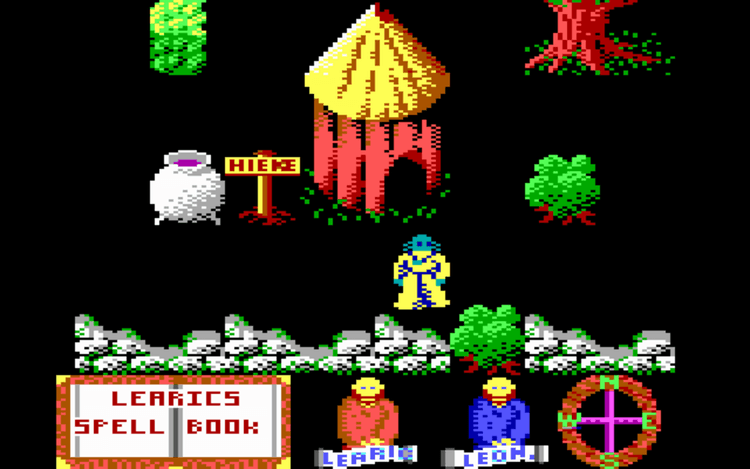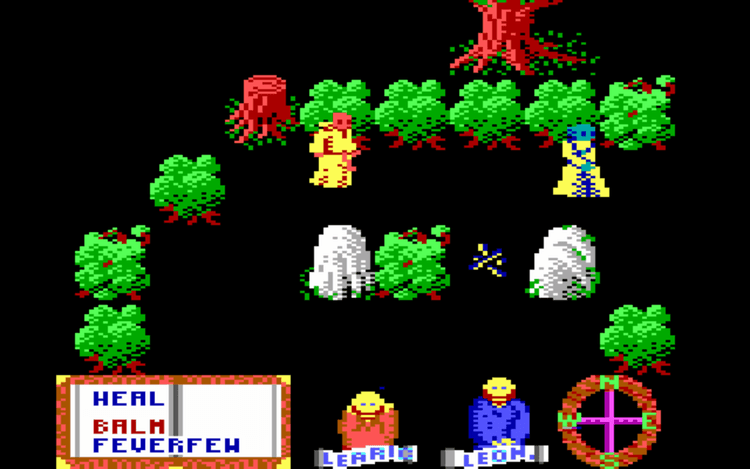
Feud is a classic wizard duel game published by Mastertronic, inviting players to roam a scrolling landscape, gather rare herbs, and outwit a rival sorcerer. Combining the open-ended hunt of Archon with the cat-and-mouse tension found in Gauntlet’s boss rushes, it stands out for seamless, timeless design and brisk pacing. Play online instantly in any browser, savor strategic potion crafting, wander through atmospheric countryside vistas, and experience reactive combat that remains compelling, accessible, and endlessly replayable decades after release, even on modern devices and touch screens that translate its intuitive controls perfectly.
Feud emerged in the late 1980s, a period when home computers were awash with inventive experiments, and it quickly carved a niche as one of the era’s most memorable wizard-duel adventures. Developed by the imaginative team at Binary Design and published for DOS by Mastertronic, the game places players in the flowing robes of Learic or his sinister rival Leanoric, two sorcerers locked in an eternal grudge match across a richly scrolling countryside. Instead of level-by-level progression, Feud’s design turns the entire terrain into a living sandbox, demanding quick wits and deft exploration as herbs are gathered, potions brewed, and spells flung in real time. Even decades on, the core idea of roaming freely and improvising combat strategies remains refreshingly modern, lending the experience a timeless quality that newcomers continue to appreciate.
Learic and Leanoric’s bitter rivalry is the beating heart of Feud, and Mastertronic ensured that every inch of the playfield reinforces their clash. Players roam a pastoral landscape dotted with cottages, rivers, and ancient ruins, constantly listening for the telltale chime that signals the enemy’s presence nearby. Gathering herbs is more than simple collectibles farming: each plant spawns in logical biomes and at varying intervals, encouraging memorisation of routes and forcing tactical choices when time is short. Because both sorcerers draw from the same herb pool, the world feels dynamically contested; every sprig of nagle or sprout of blibbery becomes a potential turning point in the duel. The result is an emergent rhythm of hunt, retreat, and ambush that few contemporaries, even vaunted genre cousins such as Archon or Druid, managed to capture with equal spontaneity.
Beneath its accessible veneer lies a surprisingly deep strategy layer that rewards forward planning as much as lightning reactions. Collecting ingredients is only the first step; Learic must combine them into ten distinct potions that range from offensive salvos like the cyan fireball to utility brews such as invisibility or teleportation. Since the cauldron menu pauses neither time nor the rival’s advance, decisive selection is essential; dithering with recipes often invites a sudden flame bolt from off-screen. This risk-reward tension keeps every match tense and personal, elevating Feud from a simple arcade romp into a cerebral duel where psychological feints matter almost as much as spell choice. Players who relish the chess-like spell economy of titles such as Master of Magic or early Ultima instalments will find Feud’s quick, focused take on magical resource management instantly compelling.
Thanks to modern emulation techniques and enthusiastic preservation efforts, it is now effortless to play Feud online without downloading bulky installers or configuring vintage hardware. Open a compatible browser, tap the start button, and watch the familiar titles roll as smoothly on a phone screen as on a classic CRT. The control scheme—simple directional inputs paired with a single key or touch action to open the potion book—translates elegantly to touch interfaces, so gathering herbs or unleashing a sudden lightning strike feels natural on tablets and handhelds alike. Because the original code has no in-app locks or episodic gating, every spell and location is available from the first moment, inviting newcomers to experiment freely and veterans to rekindle old rivalries at their own pace. Better still, online play respects the rhythm of the original: sessions load near instantaneously, performance is buttery even on modest hardware, and the experience remains completely free from restrictive paywalls or time-limited demos, ensuring that Feud’s approachable magic is always just a click—or tap—away.
Even viewed through today’s high-resolution lenses, Feud’s visuals retain a quaint allure. Each screen scrolls smoothly across a countryside rendered in earthy greens and ochres, punctuated by the vividly coloured robes of the battling wizards. Despite the modest colour palette typical of DOS VGA hardware, Binary Design coaxed surprising atmosphere out of the engine through subtle shading and expressive sprite animation: Learic’s cape flutters in the breeze, ghosts drift ethereally near tombstones, and villagers scatter when spells erupt nearby. The audio design complements the visuals with a bouncy yet ominous soundtrack that ebbs and flows, punctuated by crisp digital effects when fireballs detonate or lightning crackles. This cohesive presentation evokes the same instant nostalgia that players feel for genre greats such as Gauntlet, yet it stands apart through its pastoral setting and emphasis on one-on-one showdowns instead of dungeon hordes.
Four decades after its debut, Feud continues to captivate because it encourages improvisation rather than memorisation. Players must weigh aggressive pursuit against careful foraging, all while adapting to an opponent who evolves in real time instead of following scripted paths. Whether you cast your first spell via a keyboard, joystick, or touch overlay, movement remains intuitive: guide your wizard with directional inputs, open the spell book with a single command, select a potion, and release to cast. From there the duel is limited only by your cunning. It is this fusion of simple controls with open-ended tactical possibilities that keeps Feud not merely relevant but evergreen.
All used codes are publicly available and the game belongs to its original authors.
Share game
Share game




Share game